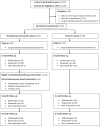Comparison of group-based outpatient physiotherapy with usual care after total knee replacement: a feasibility study for a randomized controlled trial
- PMID: 27068368
- PMCID: PMC5405852
- DOI: 10.1177/0269215516642503
Comparison of group-based outpatient physiotherapy with usual care after total knee replacement: a feasibility study for a randomized controlled trial
Abstract
Objective: To evaluate the feasibility of conducting a randomized controlled trial comparing group-based outpatient physiotherapy with usual care in patients following total knee replacement.
Design: A feasibility study for a randomized controlled trial.
Setting: One secondary-care hospital orthopaedic centre, Bristol, UK.
Participants: A total of 46 participants undergoing primary total knee replacement.
Interventions: The intervention group were offered six group-based exercise sessions after surgery. The usual care group received standard postoperative care. Participants were not blinded to group allocation.
Outcome measures: Feasibility was assessed by recruitment, reasons for non-participation, attendance, and completion rates of study questionnaires that included the Lower Extremity Functional Scale and Knee Injury and Osteoarthritis Outcome Score.
Results: Recruitment rate was 37%. Five patients withdrew or were no longer eligible to participate. Intervention attendance was high (73%) and 84% of group participants reported they were 'very satisfied' with the exercises. Return of study questionnaires at six months was lower in the usual care (75%) than in the intervention group (100%). Mean (standard deviation) Lower Extremity Functional Scale scores at six months were 45.0 (20.8) in the usual care and 57.8 (15.2) in the intervention groups.
Conclusion: Recruitment and retention of participants in this feasibility study was good. Group-based physiotherapy was acceptable to participants. Questionnaire return rates were lower in the usual care group, but might be enhanced by telephone follow-up. The Lower Extremity Functional Scale had high responsiveness and completion rates. Using this outcome measure, 256 participants would be required in a full-scale randomized controlled trial.
Keywords: Group-based exercise; feasibility; randomized controlled trial; total knee replacement.
Conflict of interest statement
Similar articles
-
Effectiveness and cost-effectiveness of outpatient physiotherapy after knee replacement for osteoarthritis: study protocol for a randomised controlled trial.Trials. 2016 Jun 13;17(1):289. doi: 10.1186/s13063-016-1418-x. Trials. 2016. PMID: 27296366 Free PMC article. Clinical Trial.
-
Comparison of postdischarge physiotherapy versus usual care following primary total knee arthroplasty for osteoarthritis: an exploratory pilot randomized clinical trial.Clin Rehabil. 2012 Jul;26(7):629-41. doi: 10.1177/0269215511427749. Epub 2011 Dec 16. Clin Rehabil. 2012. PMID: 22180446 Clinical Trial.
-
Outpatient physiotherapy versus home-based rehabilitation for patients at risk of poor outcomes after knee arthroplasty: CORKA RCT.Health Technol Assess. 2020 Nov;24(65):1-116. doi: 10.3310/hta24650. Health Technol Assess. 2020. PMID: 33250068 Free PMC article. Clinical Trial.
-
Folic acid supplementation and malaria susceptibility and severity among people taking antifolate antimalarial drugs in endemic areas.Cochrane Database Syst Rev. 2022 Feb 1;2(2022):CD014217. doi: 10.1002/14651858.CD014217. Cochrane Database Syst Rev. 2022. PMID: 36321557 Free PMC article.
-
Better post-operative prediction and management of chronic pain in adults after total knee replacement: the multidisciplinary STAR research programme including RCT.Southampton (UK): National Institute for Health and Care Research; 2023 Jun. Southampton (UK): National Institute for Health and Care Research; 2023 Jun. PMID: 37494508 Free Books & Documents. Review.
Cited by
-
Effectiveness and cost-effectiveness of outpatient physiotherapy after knee replacement for osteoarthritis: study protocol for a randomised controlled trial.Trials. 2016 Jun 13;17(1):289. doi: 10.1186/s13063-016-1418-x. Trials. 2016. PMID: 27296366 Free PMC article. Clinical Trial.
-
Effectiveness and safety of outpatient rehabilitation versus home-based rehabilitation after knee arthroplasty: a systematic review and meta-analysis.J Orthop Surg Res. 2023 Sep 19;18(1):704. doi: 10.1186/s13018-023-04160-2. J Orthop Surg Res. 2023. PMID: 37726800 Free PMC article.
-
Not All Patients Need Supervised Physical Therapy After Primary Total Knee Arthroplasty: A Systematic Review and Meta-Analysis.Cureus. 2023 Feb 20;15(2):e35232. doi: 10.7759/cureus.35232. eCollection 2023 Feb. Cureus. 2023. PMID: 36968854 Free PMC article. Review.
-
Assessment of Outcomes of Inpatient or Clinic-Based vs Home-Based Rehabilitation After Total Knee Arthroplasty: A Systematic Review and Meta-analysis.JAMA Netw Open. 2019 Apr 5;2(4):e192810. doi: 10.1001/jamanetworkopen.2019.2810. JAMA Netw Open. 2019. PMID: 31026026 Free PMC article.
-
Clinical and cost-effectiveness of physiotherapy interventions following total knee replacement: a systematic review and meta-analysis.Arch Orthop Trauma Surg. 2021 Oct;141(10):1761-1778. doi: 10.1007/s00402-021-03784-5. Epub 2021 Feb 7. Arch Orthop Trauma Surg. 2021. PMID: 33554305 Free PMC article.
References
-
- National Joint Registry, 12th Annual Report 2014. Hemel Hempstead: NJR Centre.
-
- Artz N, Dixon S, Wylde V, Beswick A, Blom A, Gooberman-Hill R. Physiotherapy provision following discharge after total hip and total knee replacement: A survey of current practice at high-volume NHS hospitals in England and Wales. Musculoskel Care 2013; 11: 31–38. - PubMed
-
- Peter WF, Nelissen RG, Vliet Vlieland TP. Guideline recommendations for post-acute postoperative physiotherapy in total hip and knee arthroplasty: Are they used in daily clinical practice? Musculoskel Care 2014; 12: 125–131. - PubMed
Publication types
MeSH terms
Grants and funding
LinkOut - more resources
Full Text Sources
Other Literature Sources
Medical


